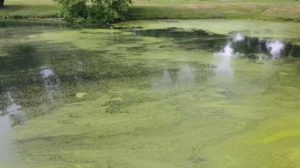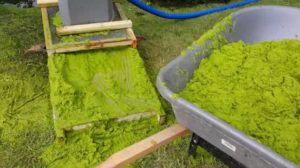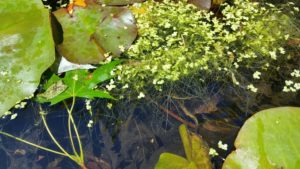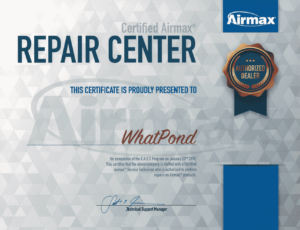Water meal is actually a small plant that can be a 1/64 of an inch up to 1/16 of and inch. If you suspect you may have Water meal pick some up out of the pond and rub between your fingers, it will feel rough.I guess like corn meal if you ever had the opportunity to hold corn meal. To get the point across it does have a texture. There are 3 different species of Water meal.
Another little fact is that the Water meal floats on the surface and is blown around by the wind (free floating plant). Sometimes looking like someone dumped green paint into the pond. Water meal is pretty bad as it can double its size in 24 hours. Not bigger dimension but rather covering the pond so more like doubling its foot print as it reproduces rather quickly.
Water meal can and will cover the entire pond over time, blocking out sunlight and perverting surface aeration. Bottom diffused aeration can help by pushing away a hole in the Water meal at the surface. The aeration will help to add oxygen to the water, bind phosphates to the bottom of the pond and help with beneficial pond bacteria’s.
There is no known biological management for Water meal such as Tri Ploid grass carp it is not on their diet list. Some water fowl may nibble at it but not really effective even if they did eat enough they’ll carry it from pond to pond.
Mechanical removal will help but is rather time consuming using a net. We’ve tried this as soon as it
shows up but will soon populate quicker than you might be able to keep up with it. Another option is pumping it out. Two different was to pump out I mean same pumping method but one way you would lose water or the other would allow the water back into the pond be screening of the Water meal.
Let’s take a quick look at Duckweed sometimes confused as Water meal. Again this is a floating plant which is telling us the pond is high in nutrients since theses floating plants are getting their food from the water. The difference between Water meal and duck weed is the shape of the plant. Duckweed has actual leaves or petals and the biggest tell tale sign is a tiny root that hangs from the bottom. The image shows a lot of roots since there are many plants and they have been growing for a long time. Typically it would be hard to see the root while on your finger.
Duckweed does have more of a dietary value for waterfowl and Tri Ploid grass carp but again not that these critters would be able to wipe out the entire pond from these plants. Duckweed can also be netted out or pump out as we discussed earlier.
If we do try the mechanical method of netting, skimming and even pumping these floating weeds, the best time to do it is when the wind has blown the plants to one end of the pond. This way they are all concentrated and easy to get to, along with getting more per netting or scooping. If these plants are in one layer, sort of spread through out the pond it is much tougher to capture because they can easily float or be pushed away from the net or skimmer.
Chemical treatments might be a choice as well if other methods do not work. There are only a couple chemical treatments that will work on Water meal and Duckweed. Ranging from $200.00 to $1000.00 per acre to treat Duckweed or Water meal, One of the chemicals require the chemical be in the pond for 30 days to be effective, so if the pond has flow through then the chemical will be washed out and not get the results that are wanted. On the other hand a different chemical will require only 24 hour being effective but the PH needs to be low, not too big of a deal as there are additives that can help lower the PH in the mix tank. Treatment should be done in the am while the natural PH is lowest in the mornings.
Again if you wish to treat with chemicals use the contact page and we can work together to get the right product for the weed(s) in question. Don’t guess on what to use you could harm yourself or the environment using the wrong mixture or wrong chemical for the task at hand.




